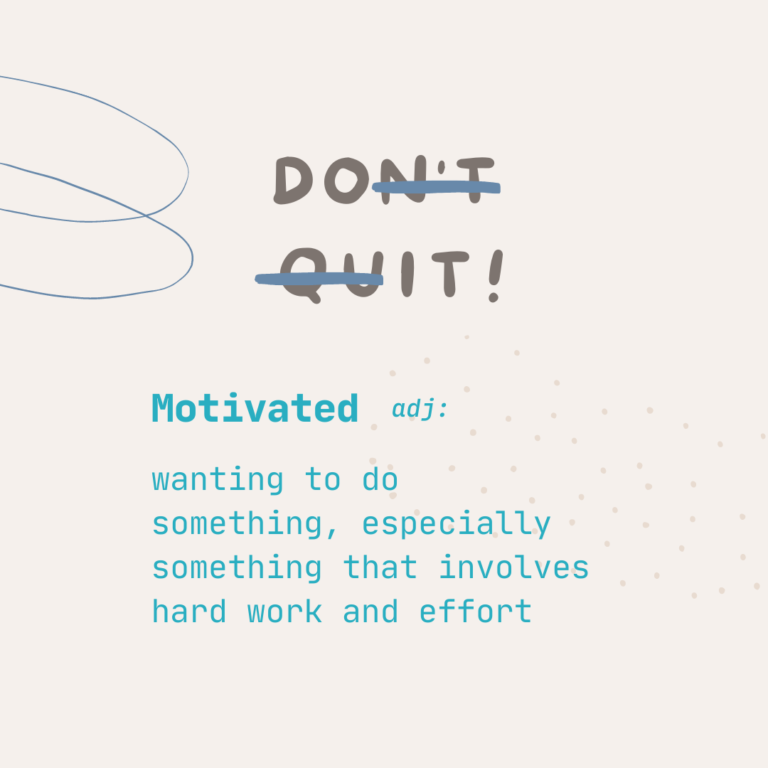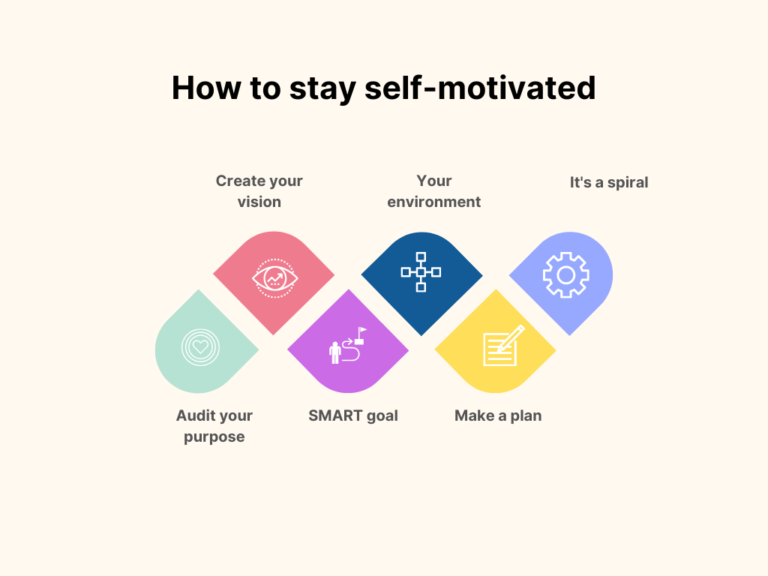How to be motivated at work (or at anything you want to do in life)
If I do what I like, I will always be motivated and never get tired, or bored, right?
Unfortunately, it isn’t true and many of us I’m sure would feel the same. I lost count of how many of my friends, family, clients complained about their fear of losing motivation, as they watch over and over their motivation fading away – even with things they thought they are passionate about. How does that happen? Interest alone isn’t sufficient to drive our action? Why do artists hate their work, or no longer want to finish it?
In his book “Drive” and his Ted talk, Daniel Pink gave you a thorough insight on what is missing and what is needed to stay motivated.
We then will map step by step how to nurture (or reclaim back) our motivation.

Intrinsic motivation and extrinsic motivation
A popular definition you could find out there to differentiate between intrinsic motivation and extrinsic motivation is while extrinsic motivation arises when you do something to earn a reward or avoid punishment, intrinsic motivation is when you do things just for the sake of doing it. However, it doesn’t mean reward and punishment always come under extrinsic motivation. Many times reward and punishment are created by ourselves. Simply put, intrinsic motivation comes from within and extrinsic motivation comes from outside, no matter under what forms they are being expressed.
Why we lose motivation
How come a task or a work we used to love now feels like a chore, that we have to drag ourselves hard to get done? The lack of one of the three things below might be the reason why.
1. Autonomy: the freedom to do what you want to do, have control over when you want to do it.
If the task you do just to please someone (our boss, our team, our clients, everyone?), you start losing your grips. You lose your freedom to decide what works for you. You lose your authenticity in the way you express yourself through the task, the way you accomplish and deliver the task.
Many artists experience burnout from their job is because they lost 100% control over their artwork. When they have to strictly follow the requirements from clients/boss, very likely the performance will decrease, to the point that they hate what’s once their passion. If you are in the same situation, feeling trapped all the time by rules and deadlines, consider discussing with your boss in the upcoming performance or professional development review how you would like to fuel your creative expression.
In your fitness plan, does the fitness center offer you equipment to do whatever exercise you want? Or does your schedule allow you to workout when most convenient for you?
Also, if you compare yourself to others, autonomy will disappear too. You now can’t freely do what you feel like, instead you try to mimic others. You unconsciously set some rules that are not really aligned with you. No wonder why it gets boring and you become unmotivated.
2. Mastery: the desire to get better at something that matters.
You are being bored with your routine? When things become a routine, they trap you in a loop and it’s hard to maintain the excitement. If it still matters to you, see if there’s a way to make it more interesting, to add some more challenges.
Feeling trapped, that you can’t change and can’t make a difference? If the working environment is so inflexible, in a way that only requires you to do a certain job in a certain way to get a certain result, then surely you are stuck with a “dead-end” job and you will constantly lose motivation to work.
One thing to keep in mind for mastery is that the challenge shouldn’t be too hard or too easy. This is where some failures in staying motivated to workout or build new habits fall into. It’s also where you feel overwhelmed by your workload or where your perfectionism betrays you– the unrealistic goal. Too easy will create boredom, too hard will create anxiety. And both will kill your motivation.
3. A sense of purpose: the yearning to do what we do in the service of something larger than ourselves.
Do you see the purpose of what you are trying to do? If your answer is no, if the thing you want to be motivated to do is meaningless, naturally there’s nothing that can force you to do it.


A sense of purpose was there in corporate culture a while ago, but now with Great Resignation going on, it’s even more clear the culture of purpose is no longer a one-way street, where companies constantly repeat their mission and vision to fuel the sense of purpose in employees. We have to find that intrinsic motivator within ourselves: 𝑰𝒔 𝒚𝒐𝒖𝒓 𝒘𝒐𝒓𝒌 𝒎𝒆𝒂𝒏𝒊𝒏𝒈𝒇𝒖𝒍 𝒕𝒐 𝒚𝒐𝒖?
Okay then, how to stay self-motivated?
Step 1: Audit your purpose
Why do you want to do this? Can you relate to the reason you just said?
Step 2: Create your vision
What would you like to see happen when you stay motivated and do this? Is the vision clear and compelling? Is the vision aligned with your Why in step 1?
Step 3: Redefine your goal
You have to understand that it can take time to achieve the clear vision you have in step 2. So be kind to yourself and know that by breaking down into small stages with a SMART goal for each stage, you will finally get to where you want.
Be specific
Be measurable
Be attainable
Be relevant
With a time frame
After ticking all those boxes, ask yourself again: does that sound realistic to you?


Step 4: Audit your environment
Remember the autonomy and mastery we discussed earlier? Check your current situation and environment, what is within your control in terms of freedom (time, expression, execution), and what is out of your control? Connect that with the goal in step 3. Is your goal still realistic? Or is your goal can be amplified a bit more to push your mastery power?
Step 5: Make a plan
Okay, now you have your goal, your resources, your Why, a plan will answer how you would use your resources to achieve that goal:
Is there anything you can say No to make room to say Yes for this goal?
To whom can you share this goal to keep yourself accountable?
A little reward or punishment might be a sweet kick. How about an ice cream if I can achieve the 1st goal. How about 1 week with no chocolate if I can’t? (or dear I couldn’t imagine that punishment for myself, but maybe that’s why it plays its role nicely)
Step 6: It’s a spiral, not a straight line.
No matter how perfect your plan, your goal, and purpose might sound, there will be a time you might lose that motivation for a moment, not because of you, but because we have so many things going on in our life every day. Just take a pause, go back to step 1 and reflect again, do any adjustments if need to. Remember, you are moving in a spiral, not back to square 1, so be kind to yourself.
The final piece
Check the nature of work before developing your motivation.
Research shows that money incentives or carrots and sticks work for simple, straightforward tasks, with clear rules and clear destinations. Some examples might be:
- A competition, a game, a fight – where we have clear rules and a clear definition of win
- Some structured office tasks – when clear instructions are provided and the doer is required no further improvement than just to follow the instructions and get the job done.
- Fitness, workout, or building new habits that require you to set a specific goal, and follow certain rules. Here is where the reward or punishment can come from either inside or outside. If you do it, then what? A reward can be the vision of the near future, either painted by you or someone else when you achieve your goal; or punishment – the pain when you fail to achieve your goal.
However, in the complex world we have today, clear rules and clear goal many times seem luxurious. In that case, don’t invest in money incentives, instead, go through 6 steps and make sure autonomy, mastery and a sense of purpose are taken into account.
References:
Pink, D. H. (2011). Drive: The surprising truth about what motivates us. Penguin.



